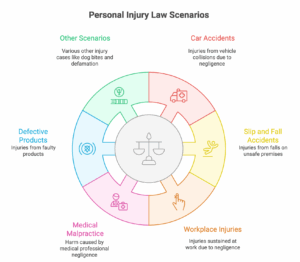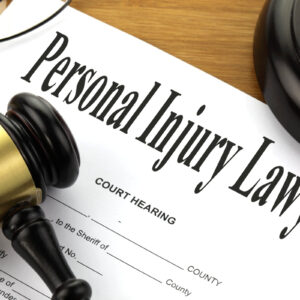Life throws curveballs. Sometimes those curveballs are thrown by someone else’s carelessness, resulting in injury. If you’ve been hurt due to another person’s negligence, you might be entitled to compensation under personal injury law. But where does personal injury law apply? This guide breaks down common scenarios and explains your rights, helping you understand when seeking legal help is the best course of action.
Understanding Personal Injury Law: An Overview
Personal injury law exists to protect individuals who have been injured due to the fault of another. It’s a branch of civil law that allows injured parties to seek financial compensation – often referred to as “damages” – to cover losses resulting from the injury. These losses can include medical bills, lost wages, pain and suffering, and even property damage.
To succeed in a personal injury claim, you generally need to prove that someone else was negligent (meaning they failed to act with reasonable care) and that their negligence directly caused your injuries. Think of it as a chain reaction: carelessness leads to an incident, which results in harm.

1 Car Accidents and Personal Injury Claims
Car accidents are a leading cause of personal injury claims. Even seemingly minor accidents can result in significant injuries and expenses.
Scenario: Imagine you’re rear-ended at a red light. The other driver was texting and didn’t see you come to a stop. You suffer from whiplash and need physical therapy. This is a classic example of negligence causing injury.
Insurance Companies: Here’s where insurance companies come into play. The at-fault driver’s insurance should cover your medical bills, lost wages if you have to miss work, and potentially, compensation for your pain and suffering. Unfortunately, dealing with insurance companies can be a challenging task. They may try to minimise payouts or deny your claim altogether. Having a personal injury attorney can level the playing field and ensure you receive fair compensation.
Successful Case Example: A woman in Florida was severely injured in a head-on collision caused by a drunk driver. She hired a personal injury attorney who secured a $2.3 million settlement to cover her medical expenses, lost income, and long-term care needs.
2. Slip and Fall Accidents: When Does Personal Injury Law Apply?
Slip and fall accidents might seem trivial, but they can lead to serious injuries, especially for older adults. Property owners have a responsibility to maintain safe premises.
Scenario: You’re shopping at a grocery store, and you slip on a spilt liquid that wasn’t cleaned up. You break your wrist and need surgery.
For a successful slip and fall claim, you typically need to show that the property owner knew or should have known about the hazardous condition and failed to take reasonable steps to correct it.
Data Point: The National Safety Council reports that falls are a leading cause of unintentional injuries and deaths in the U.S., highlighting the importance of holding negligent property owners accountable.
3. Workplace Injuries and Your Rights
Workplace injuries are unfortunately common, despite the implementation of safety regulations. If you’re injured at work, you might be entitled to workers’ compensation benefits, and in some cases, you might also have a personal injury claim against a third party.
Scenario: A construction worker is injured when a faulty crane collapses. In addition to workers’ compensation, the worker might have a personal injury claim against the crane manufacturer if the crane was defective.
4. Medical Malpractice: Seeking Justice for Negligence
Medical malpractice occurs when a healthcare professional’s negligence causes harm to a patient. This can include misdiagnosis, surgical errors, medication errors, and birth injuries.
Scenario: A doctor fails to diagnose cancer promptly, allowing it to progress to a more advanced stage.
Medical malpractice cases are often complex and require expert testimony to establish the standard of care and prove that the doctor deviated from that standard.
6. Defective Products: Holding Manufacturers Accountable with Personal Injury Law
When a product is defective and causes injury, the manufacturer can be held liable under product liability laws. This applies to a wide range of products, including cars, appliances, medications, and medical devices.
Scenario: A faulty airbag in a car fails to deploy during an accident, resulting in more severe injuries than would have otherwise occurred.
Real-World Example: The Takata airbag recall, affecting millions of vehicles worldwide, highlighted the serious consequences of defective products and the importance of holding manufacturers accountable. Many individuals who were injured received significant compensation due to Takata’s negligence.
5. Other Scenarios Where Personal Injury Law Can Help
Personal injury law extends beyond the scenarios mentioned above. Other examples include:
- Dog Bites: Owners are often liable for injuries caused by their dogs.
- Assault and Battery: Intentional acts of violence can lead to both criminal charges and civil lawsuits for damages.
- Nursing Home Abuse: Neglect or abuse of elderly residents in nursing homes is a serious issue.
- Defamation: False statements that harm your reputation can be grounds for a lawsuit.
What to Do If You’ve Been Injured:
- Seek Medical Attention: Your health is the top priority.
- Document Everything: Keep records of medical bills, lost wages, and other expenses. Take photos of the scene of the incident and any visible injuries.
- Consult with a Personal Injury Attorney: A lawyer can evaluate your case, advise you on your legal options, and help you navigate the claims process.
Choosing the Right Personal Injury Attorney:
Look for an attorney with experience in personal injury law, a strong track record of success, and a commitment to client service. Ask about their fees and how they will handle your case. Many personal injury attorneys work on a contingency fee basis, meaning they only get paid if they win your case.
Alternative Dispute Resolution (ADR):
Before going to trial, many personal injury cases are resolved through alternative dispute resolution methods, such as mediation or arbitration. Mediation involves a neutral third party who helps the parties settle. Arbitration is a more formal process where a neutral arbitrator hears evidence and makes a binding decision.
Personal injury law is designed to protect you when someone else’s carelessness causes you harm. Understanding your rights and seeking legal advice can help you recover the compensation you deserve and move forward with your life.






F*ckin’ tremendous things here. I’m very happy to peer your article. Thanks a lot and i’m taking a look forward to contact you. Will you kindly drop me a mail?